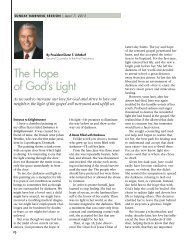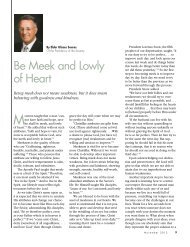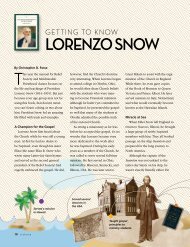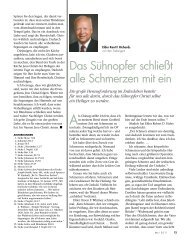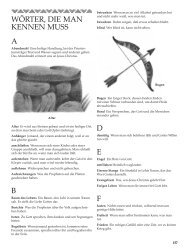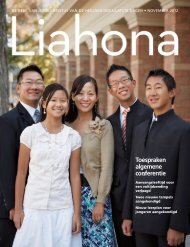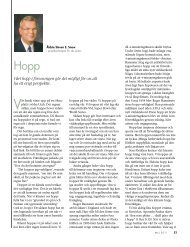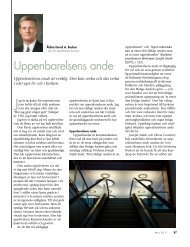Ensign, Nov. 2007 - The Church of Jesus Christ of Latter-day Saints
Ensign, Nov. 2007 - The Church of Jesus Christ of Latter-day Saints
Ensign, Nov. 2007 - The Church of Jesus Christ of Latter-day Saints
Create successful ePaper yourself
Turn your PDF publications into a flip-book with our unique Google optimized e-Paper software.
<strong>of</strong>t-noted “mystery <strong>of</strong> the trinity.”<br />
<strong>The</strong>y are three distinct persons, yet<br />
not three Gods but one. All three persons<br />
are incomprehensible, yet it is<br />
one God who is incomprehensible.<br />
We agree with our critics on at least<br />
that point—that such a formulation<br />
for divinity is truly incomprehensible.<br />
With such a confusing definition <strong>of</strong><br />
God being imposed upon the church,<br />
little wonder that a fourth-century<br />
monk cried out, “Woe is me! <strong>The</strong>y<br />
have taken my God away from me, . . .<br />
and I know not whom to adore or to<br />
address.” 5 How are we to trust, love,<br />
worship, to say nothing <strong>of</strong> strive to be<br />
like, One who is incomprehensible<br />
and unknowable? What <strong>of</strong> <strong>Jesus</strong>’s<br />
prayer to His Father in Heaven that<br />
“this is life eternal, that they might<br />
know thee the only true God, and<br />
<strong>Jesus</strong> <strong>Christ</strong>, whom thou hast sent”? 6<br />
It is not our purpose to demean<br />
any person’s belief nor the doctrine<br />
<strong>of</strong> any religion. We extend to all the<br />
same respect for their doctrine that<br />
we are asking for ours. (That, too, is<br />
an article <strong>of</strong> our faith.) But if one says<br />
we are not <strong>Christ</strong>ians because we do<br />
not hold a fourth- or fifth-century<br />
view <strong>of</strong> the Godhead, then what <strong>of</strong><br />
those first <strong>Christ</strong>ian <strong>Saints</strong>, many<br />
<strong>of</strong> whom were eyewitnesses <strong>of</strong> the living<br />
<strong>Christ</strong>, who did not hold such a<br />
view either? 7<br />
We declare it is self-evident from<br />
the scriptures that the Father, the<br />
Son, and the Holy Ghost are separate<br />
persons, three divine beings, noting<br />
such unequivocal illustrations as the<br />
Savior’s great Intercessory Prayer just<br />
mentioned, His baptism at the hands<br />
<strong>of</strong> John, the experience on the Mount<br />
<strong>of</strong> Transfiguration, and the martyrdom<br />
<strong>of</strong> Stephen—to name just four.<br />
With these New Testament sources<br />
and more 8 ringing in our ears, it may<br />
be redundant to ask what <strong>Jesus</strong> meant<br />
when He said, “<strong>The</strong> Son can do nothing<br />
<strong>of</strong> himself, but what he seeth the<br />
Father do.” 9 On another occasion He<br />
said, “I came down from heaven, not<br />
to do mine own will, but the will <strong>of</strong><br />
him that sent me.” 10 Of His antagonists<br />
He said, “[<strong>The</strong>y have] . . . seen<br />
and hated both me and my Father.” 11<br />
And there is, <strong>of</strong> course, that always<br />
deferential subordination to His<br />
Father that had <strong>Jesus</strong> say, “Why callest<br />
thou me good? there is none good<br />
but one, that is, God.” 12 “My father is<br />
greater than I.” 13<br />
To whom was <strong>Jesus</strong> pleading so<br />
fervently all those years, including in<br />
such anguished cries as “O my Father,<br />
if it be possible, let this cup pass from<br />
me” 14 and “My God, my God, why hast<br />
thou forsaken me”? 15 To acknowledge<br />
the scriptural evidence that otherwise<br />
perfectly united members <strong>of</strong> the Godhead<br />
are nevertheless separate and<br />
distinct beings is not to be guilty <strong>of</strong><br />
polytheism; it is, rather, part <strong>of</strong> the<br />
great revelation <strong>Jesus</strong> came to deliver<br />
concerning the nature <strong>of</strong> divine<br />
beings. Perhaps the Apostle Paul<br />
said it best: “<strong>Christ</strong> <strong>Jesus</strong> . . . being<br />
in the form <strong>of</strong> God, thought it not<br />
NOVEMBER <strong>2007</strong> 41



